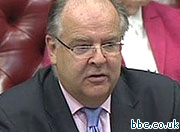A contentious plan which would allow terminally ill people to undergo an assisted suicide is not without risk, its own chief architect has admitted.
Last week Lord Falconer’s Commission on Assisted Dying released a report saying that adults thought to have less than a year to live should be able to ask doctors for drugs which would end their life.
The report faced widespread criticism with opponents casting doubt on its impartiality.
Euthanasia
Lord Falconer, the Commission’s chairman, has admitted the plan is not perfect, saying: “I don’t think you can ever have a system that is completely watertight.”
Dominic Lawson, writing in The Sunday Times, has drawn a link between the “unprecedented vigour of the voluntary euthanasia movement and the growing panic over the state’s ability to fund the care bill for the nation’s geriatrics”.
He added, “Falconer’s panel ended up advocating that Britain adopts a policy of medically sanctioned assisted suicide along the lines of that pioneered in the US state of Oregon.
Suicide
“It was in this apparent haven of medical enlightenment that four years ago Barbara Wagner and Randy Stroup, two cancer sufferers reliant on Medicaid for their care, were told the state would not fund any more treatment — but would pay for their assisted suicide.
“Don’t think that couldn’t happen here.”
And one multiple sclerosis (MS) sufferer said she was incensed by the report.
Feared
Kathryn Higham feared she was going to die when she was diagnosed with MS in 1999.
“I was so relieved when I found out it was not a terminal condition, I realised my life was precious,” she said.
“You shouldn’t be ending your life, every breath is precious.”

